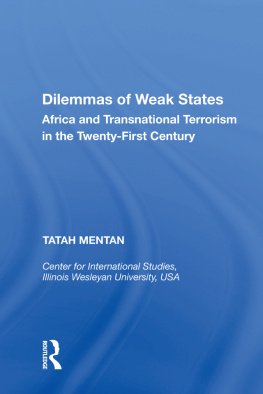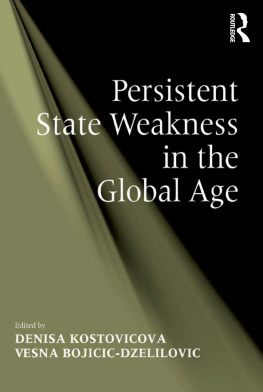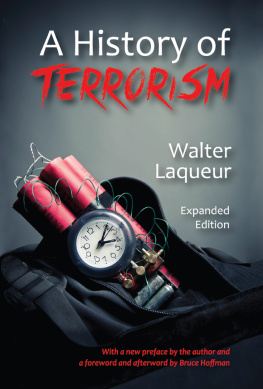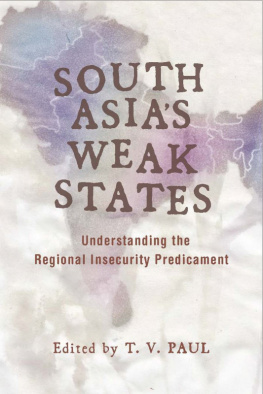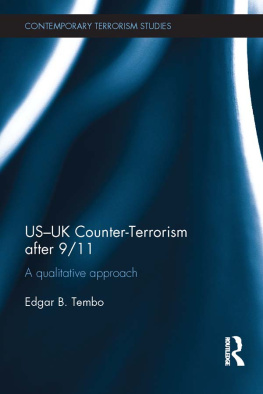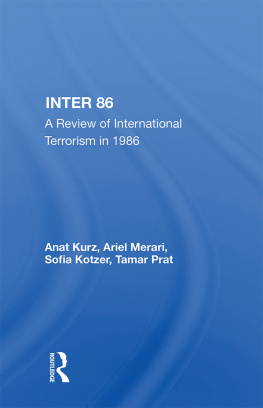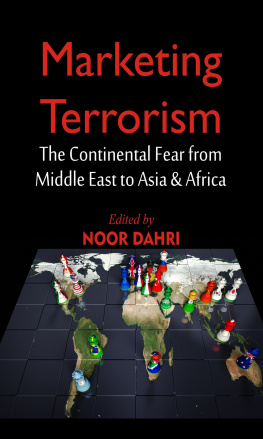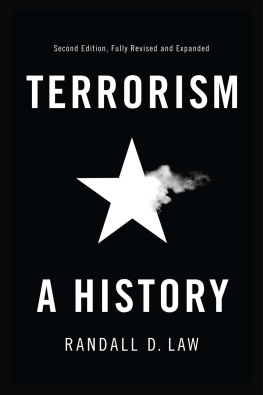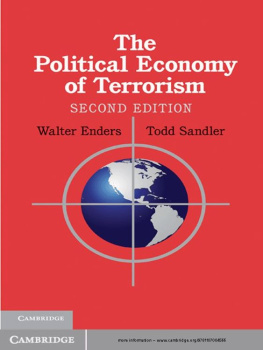DILEMMAS OF WEAK STATES
Contemporary Perspectives on Developing Societies
Series Editors
JOHN MUKUM MBAKU
Weber State University, USA
MWANGIS. KIMENYI
The University of Connecticut, USA and The Kenya Institute for Public Policy Research and Analysis, Kenya
The Contemporary Perspectives on Developing Societies series was founded to serve as an outlet for policy relevant research. Books published in this series provide rigorous analyses of issues relevant to the peoples of the Third World and their efforts to improve their participation in the global economy.
Also in this series
Akiba, O. (ed.) (2004), Constitutionalism and Society in Africa.
Kimenyi, M.S. and Meagher, P. (eds) (2004), Devolution and Development: Governance Prospects in Decentralizing States.
Kieh, Jr., G.K. and Agbese, P.O. (2004), The Military and Politics in Africa: From Engagement to Democratic and Constitutional Control.
Bangura, A.K. (2004), Sweden vs Apartheid: Putting Morality Ahead of Profit.
Kalu, K.A. (ed.) (2004), Agenda Setting and Public Policy in Africa.
Kimenyi, M.S., Mbaku, J.M. and Mwaniki, N. (eds) (2003), Restarting and Sustaining Economic Growth and Development in Africa: The Case of Kenya.
Darkoh, M.B.K. and Rwomire, A. (eds) (2003), Human Impact on Environment and Sustainable Development in Africa.
Mainuddin, R.G. (ed.) (2002), Religion and Politics in the Developing World: Explosive Interactions.
Saitoti, G. (2002), The Challenges of Economic and Institutional Reforms in Africa.
Mbaku, J.M., Agbese, P.O. and Kimenyi, M.S. (eds) (2001), Ethnicity and Governance in the Third World.
Ngoh, V.J. (2001), Southern Cameroons, 19221961: A Constitutional History.
Udogu, E.I. (ed.) (2001), The Issue of Political Ethnicity in Africa.
Magnarella, P.J. (2000), Justice in Africa: Rwanda's Genocide, its Courts, and the UN Criminal Tribunal.
Dilemmas of Weak States
Africa and Transnational Terrorism in the Twenty-First Century
Tatah Mentan
Center for International Studies, Illinois Wesleyan University, USA
First published 2004 by Ashgate Publishing
Reissued 2018 by Routledge
2 Park Square, Milton Park, Abingdon, Oxon, OX14 4RN
711 Third Avenue, New York, NY 10017, USA
Routledge is an imprint of the Taylor & Francis Group, an informa business
Tatah Mentan 2004
Tatah Mentan has asserted his right under the Copyright, Designs and Patents Act, 1988, to be identified as the author of this work.
All rights reserved. No part of this book may be reprinted or reproduced or utilised in any form or by any electronic, mechanical, or other means, now known or hereafter invented, including photocopying and recording, or in any information storage or retrieval system, without permission in writing from the publishers.
Notice:
Product or corporate names may be trademarks or registered trademarks, and are used only for identification and explanation without intent to infringe.
Publishers Note
The publisher has gone to great lengths to ensure the quality of this reprint but points out that some imperfections in the original copies may be apparent.
Disclaimer
The publisher has made every effort to trace copyright holders and welcomes correspondence from those they have been unable to contact.
ISBN 13: 978-0-815-38855-5 (hbk)
ISBN 13: 978-1-351-15992-0 (ebk)
Poverty, unemployment and hopelessness create breeding grounds for terrorists (President of the United States, George W. Bush).
In the wake of September 11, the threat of terrorism has given weight to propositions like the one above by President George Bush. The problems of weak or failed nation-states have become an immediacy and importance that transcend their previous humanitarian dimensions. Since the early 1990s, wars in and among weak or failed states have killed about eight million people, most of them civilians, and displaced another four million. The number of those impoverished, malnourished, and deprived of fundamental needs such as security, health care, and education has totaled in the hundreds of millions.
Although the phenomenon of state failure or weakness is not new, it has become much more relevant and worrying than ever before. In less interconnected eras, state weakness could be isolated and kept distant. Failure had fewer implications for peace and security. Now, these states pose dangers not only to themselves and their neighbors but also to peoples around the globe. The reason, which is actually the argument of this work, is that such weak or failed states are prone to capture by special interest groups, like international terrorist networks or cartels. Therefore, preventing states from failing, and resuscitating those that have failed, are thus strategic and moral imperatives today.
The problem of the weak state is not new, either in the 21st century or in the history of mankind. But the post-seventeenth century world and now the post-Cold War world have introduced concepts and objective conditions that serve as turning points, which shape the meaning and the effects of nation-state weakness or failure. The first turning point was The Treaty of Westphalia (1648) that brought to a close the religious wars in Europe. It also marked the beginnings of the modern state, a territorial entity in which the governed and the governing form a compact of reciprocal rights and obligations. In return for individual securitybasically freedom from fear, from want, from internal and external conflict, and a varying degree of latitude in their daily endeavors, the governed consent to follow the decrees of the rulers, to support the state structures through the commitment of personal time, energy, fiscal resources, andin extremistheir lives for the survival of the state. This social contract, in whatever form it assumed, was reinforced in the 19th century by the concept of the 'volk,' in which the governed identify themselves as the state rather than a mere party to an agreement. This psychological fusion of governed with governing and the institutions of governance are called nationalism.
These developments occurred at the same time that Europeans were exploring and then intensively colonizing America, Asia, and Africa, often with no regard for the political structures and historic arrangements of these areas, hi the 20th century, from the 1930s to 1991, the great powers were engaged in ideological struggles that strengthened nationalism within opposing nations and gave rise to competition for influence in countries in what was viewed as a zero-sum game for world dominance. These struggles emphasized the political-military arena, with the presumption that the best way to influence political leanings and gain diplomatic support was to provide military hardware and pledges of military support against external foes.
Of course, with the collapse of the Soviet Union in 1991, the zero-sum game in world politics ended, as for the most part did western interest in the southern hemisphere which was left awash in military hardware at the same time that it remained an economic backwater. But it is not the presence of large quantities of arms amassed during the Cold War era that leads to what is termed the weak or failed or failing state. Historically states 'fail' because they cannot prevent conquest by a rival state, a situation that may in fact result from the absence of sufficient quantities of armaments. But in the context of the late 20th century, a weak or failed or failing state is one in which the rulers either break the underlying contract by neglecting or ignoring the fundamental freedoms due their people or, as illustrated most graphically in Rwanda in 1994, actually direct the state apparatus against and encourage one segment of the population to hunt down another segment and massacre.

